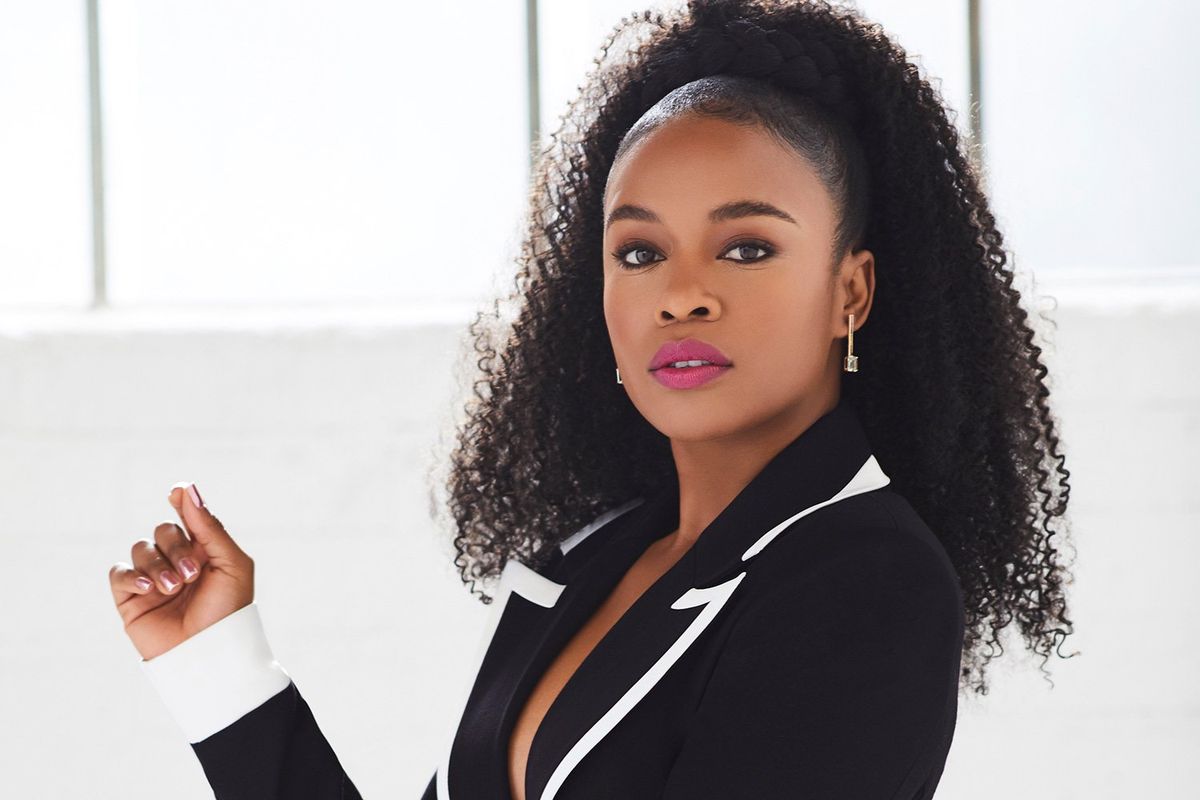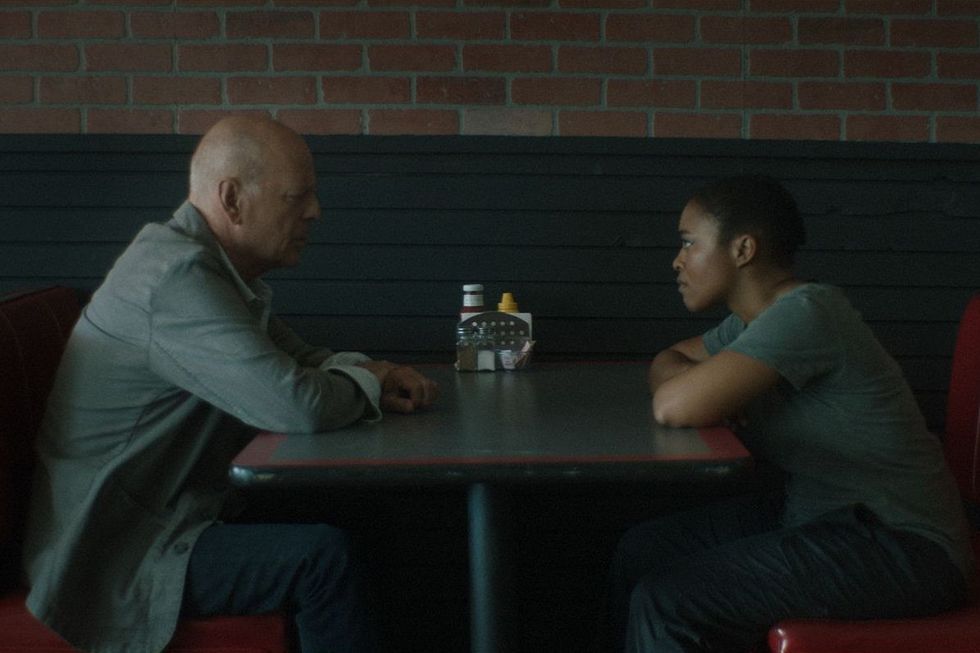Nomzamo Mbatha on Acting with Bruce Willis and Playing Shaka's Mother
The South African actress is well-known in front of the camera, but she’s also getting herself comfortable behind the lens as an executive producer.

Nomzamo Mbatha.
Two years after her first international breakout role in Coming 2 America, South African actress Nomzamo Mbatha stars in the new Jesse Atlas-directed sci-fi thriller, Assassin, alongside Bruce Willis, in his last film role. She plays Alexa, a strong-willed and determined wife who attempts to enact justice for her husband after he’s killed during a secret operation involving futuristic microchip technology. But that’s just one of the many projects this movie mogul in the making has been working on.
Mbatha also stars in the upcoming South African drama series, Shaka iLembe, as Queen Nandi, the mother of Shaka Zulu. The series is about six years in the making, after intensive research and consultation with historians to ensure historical accuracy, as well as story authenticity. Mbatha is also an executive producer on the project. After years of starring in local films like Tell Me Sweet Something (2015), All About Love (2017) and The Jakes are Missing (2015), she’s aiming to become more involved behind the scenes, too.
For Mbatha, who has created an unapologetic path for herself in the world of entertainment and humanitarianism, finding ways to branch out and flex her skills in new ways comes as no surprise.
She talks to OkayAfrica about playing a Black female sci-fi lead, working with the great Bruce Willis, bringing emotional weight to her characters, and the intricacies of being an executive producer.
Assassin Official Trailer (2023)www.youtube.com
The following Interview has been edited for length and clarity.
Black female leads in Hollywood sci-fi/fantasy films are few and far between, like Nichelle Nichols in Star Trek, Jada Pinkett-Smith in The Matrix: Reloaded. Can you tell us about your character Alexa in Assassin and what she brings to this company of women?
Alexa is a woman who is mourning a present and a future she doesn’t get to have with her lover. She’s searching for answers, and she has been in this depressive state because she wants the answers and no one is willing to give [them] to her. What we then experience throughout the film is a woman who continues to forge forward and push beyond any human limitations to get to the truth. And as we get on this journey we begin to see so many layers to her – she’s a fighter, she’s strong-minded, she’s a badass. Conversations about inclusion are so important because we need to be able to see Black women take on different roles instead of things that are always linear. To be a part of that narrative, to be a part of that movement creating bigger and better spaces to see Black women leading sci-fi films is an honor.

You do great work in capturing Alexa’s emotional and psychological burden in Assasin. How did you bring that emotional weight to the character and what makes you tick as an actress?
I love to center myself. One of my co-stars I was on a show with for many years in South Africa used to say to me, “Can we just sit in the scene? Let the scene sit. Let the characters sit in it.” And we’d always just center ourselves and be like, let’s find God in the scene because God was the truth. So whenever I have to zone in, before they call “Action!”, whether I have to be funny, emotional, dramatic, I always want to find God in the scene; I always want to find the truth in the scene.
I have to let the character sit at the bottom of my belly. And then before I have to shoot the scene, I close my eyes and do the three-way mantra of Find God, Find Truth, Let the Character Sit. After that, I’m ready to go. Whenever I feel distracted before or during the scene, it feels like I’m lying, and I’ll just ask for a retake or to start the scene again.
Bruce Willis is in Assassin, as well as well-known actors like Dominic Purcell and Mustafa Shakir. What was your experience on set, and what were the highlights of working with such well-known actors?
Mustafa is such an interesting human, and we had a lot of interesting conversations on set because our characters are in love, and there were a lot of quiet, intimate moments. He was really fun and fantastic. I made a friend out of Fernanda Andrade. And then of course working alongside Bruce Willis who was just a gentleman and awesome superstar – I was fangirling. You can see the years of being a true movie star just exuding from every pore on him.
You were the only South African in Coming 2 America and again, you’re the only South African in Assassin. Have you had any strategy for gaining international recognition?
I have no strategy for getting international recognition. I think if I did, it would just be a road to heartbreak because you can have your own plans but the rhythm of the industry takes its own shape. So the only thing you can do is show up in your best light. That’s all you can do and that’s all I do. I just want to be a better performer than I was yesterday, and I want to make really great and fantastic films. Those films aren’t all going to be perfect but I show up and do my best, and I can only hope it pays off.
On your Instagram you posted Storm (X-Men) artwork from an illustrator. Are you a fan of superhero films and would you be interested in starring in one at any point in your career?
Absolutely. I wanna fly in the air, destroy stuff, and do all the fun things actors do in superhero films! I think it’ll also be fun to play a villain.
You’re playing Queen Nandi in the upcoming epic drama series, Shaka iLembe. Can you tell us more about the character and what attracted you to the role?
We meet Queen Nandi when she’s sixteen years old. She’s feisty, she’s self-confident, arrogant to some. We see her just navigate the world of womanhood and then she meets Senzangakhona, and it becomes the age-old tale of how they met and fell in love, or lust, and we watch her grow over the years and experience what it’s like to be an outcast and give birth to a king.
Some folktales don’t give her the flowers she deserves and we really wanted to speak to modern times, and highlight how difficult it is to be a single mother who has to care for a child, do so much for it, and still have to navigate the world with so much on her shoulders.
You are an executive producer on the series and the production was about six years in the making. Can you tell us anything about the highlights and challenges?
The journey for me playing Queen Nandi and also playing an executive producer started about six to seven years ago, under the creators of Jacob’s Cross and Isibaya, Bomb Shelter, which is a South African production company. That was my first employer, and I got my first big break under them. So when the conversation of developing Shaka started, I was let in and I’ve been a part of the journey ever since.
I had to learn a lot along the way about how to be a producer, especially from Desiree [Markgraaff, managing director] who is one of the founding members of Bomb Shelter. It was an organic experience and partnership. We wanted to respect history even though everyone has their own ideas of who Shaka Zulu should be.
There were conversations about language; we couldn’t do it in English because that would change the course of the cultural texture of the story so we wanted to do it in isiZulu, which is the native language, in order to highlight the color of language. When you’re creating content out of the continent, there’s this idea that we should cater to the West but that also takes away from the authenticity.
We also had conversations about body parts, whether to show them or not. But it was the 1800s and if you do your research, all the women were bare-breasted in the pictures; that was their way of life. So all these different conversations around the non-sanitization of the story were at the core of the challenge of how best to tell this story.
There was also the issue of finding international distribution, how best to package the story that is appealing to the international market. So there were a lot of amazing things we achieved.

